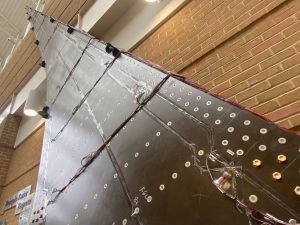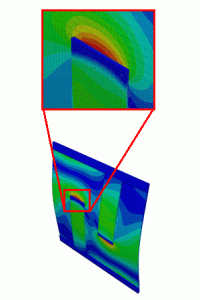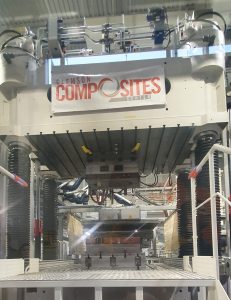University of Michigan Aerospace Engineering Ph.D. student Fernando Rojas works in a lab that researches advanced composite materials used in the aerospace industry. With help from the NSF I-Corps program, the lab expanded its network and learned how its innovation could be deployed across the aerospace industry ecosystem. For Rojas, I-Corps provided an opportunity for professional growth to prepare him for a career after graduation.
Advanced Materials in Aerospace
Rojas conducts research on advanced composite materials that have become increasingly common in the aerospace industry. These advanced materials offer increased strength and lower weight when compared with traditional materials such as aluminum. However, the major roadblock for widespread adoption has been the difficulty of testing and predicting the failure modes of these structures. To solve this problem, the team has created a failure analysis modeling software that can detect defects in composite materials.

Composite Aircraft Wings enable planes to be stronger and lighter
We are trying to analyze how composite structures fail… This is useful mostly in the aerospace sector because that’s where these materials are being used for structural applications because they’re light and very strong… Sometimes it’s a little hard to predict how they fail because they have a complex microstructure. A tool that is reliable and robust that can predict how different configurations of these materials fail can be very helpful. – Fernando Rojas

Composite Structure Experiments by the Waas Lab
Learning about the Industry through I-Corps
The teams’ first introduction to I-Corps and customer discovery was the Great Lakes I-Corps Hub’s Jumpstart Program. The course challenges teams to talk with potential customers and discover what impact their research will have outside of the lab. Going into the I-Corps program, Rojas was joined by a diverse and experienced team including Aerospace Engineering Department chair Dr. Anthony Waas, Post-Docs Dr. Royan D’Mello and Dr. Hoang Nguyen, and industry mentor Marvin Weinberger. Despite the team’s extensive research experience, I-Corps challenged some of their assumptions about innovation and industry.
I learned that some things that we’re focusing on in research are not necessarily applicable to the industry. For example, we know that you want a tool that gives you accurate answers, but in some cases, the priority is speed. For some companies, as long as it’s within 10%, they don’t really care if it’s eight or if it’s seven percent. Whatever is faster is going to be the best tool. This gave me an indication when I’m in the lab, I should try to find ways to make it more computationally efficient (faster). – Fernando Rojas
After a positive experience with the Jumpstart program, Rojas and his team decided to take their innovation to the NSF National I-Corps program. NSF I-Corps is rigorous and requires teams to conduct over 100 interviews with potential customers and Industry stakeholders.
The NSF instructors coached us on how to approach interviews in person and at conferences, and the program also provided funding to attend these conferences which was very well needed because the people that we wanted to talk to the most were at tradeshows rather than academic conferences, which are the ones that I usually attend… Having that funding helped a lot to get in front of the right people. – Fernando Rojas

With funding from I-Corps, the team traveled to South Carolina for a conference
NSF I-Corps enabled the team to learn about the industry where their innovation would be deployed. All the team members had to work together to learn to interview 100 people. Dr. Waas describes the benefits of the program:
“I-Corps was a great experience for us to learn about the commercial potential of the technology we have developed in our lab. It helped us expand our network and better understand the ecosystem, which helped us to get a clearer vision of what we needed to do to bring it to market” – Dr. Waas
GEM Fellowship and the Future
Rojas was first introduced to I-Corps via the GEM Consortium. The mission of GEM is to increase the participation of underrepresented groups in master’s and doctoral STEM programs across the country. Rojas, a GEM fellow, has been receiving support and internship opportunities. I-Corps was a part of this journey.
I-Corps was a good professional development experience regardless of whether you continue on the entrepreneurial path or not. It provides a very broad network. Now I know a hundred more people than I knew before in different departments and in different companies… I think that’s a huge advantage. – Fernando Rojas
Rojas and the Waas lab represent the potential of research and innovation. Groundbreaking technology and research combined with the desire to commercialize and impact society. For Rojas, I-Corps helped him explore the entrepreneurship world and enabled him to make valuable connections as he continues his engineering career.
Learn more about the Waas Lab’s Research
Interested in I-Corps? Our Jumpstart program for STEM researchers is coming up:
https://www.greatlakesicorps.org/events1/list/
Quotes Edited for Clarity
NSF I-Corps Hub: Great Lakes Region, 2023
